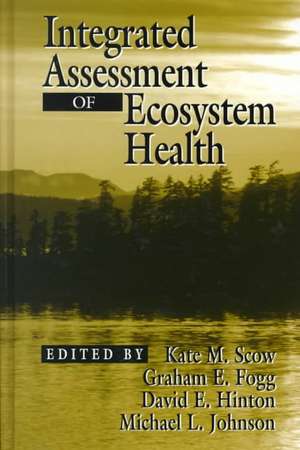Integrated Assessment of Ecosystem Health
Editat de K.M. Scow, Graham E. Fogg, David E. Hinton, Michael L. Johnsonen Limba Engleză Hardback – 12 oct 1999
The book begins with John Cairns, Jr.'s predictions and recommendations for the future ecotoxicology: "New goals must lead to new techniques.... the field of ecotoxicology is in the early stages of a major paradigm shift that is driven by three interrelated forces: 1) heightened interest in sustainable use of the planet, 2) protection of ecosystem , and 3) the shift from emphasis on avoiding deleterious effects to maintaining them in robust health."
Later chapters explore the integration of data, intrinsic remediation studies and the ever- increasing number of associated disciplines that are improving our environmental potential. Methodology, itself, is considered as an evolving tool, always in need examination and revision. Cairns, and his co-authors all advocate a constructive, offensive new form of ecoscience.
The consensus of scientists is clear: toxic threat and, especially, habitat destruction are the most important environmentl issues, today. The mandate from Integrated Assessment of Ecosystem Health is also decisive: expand the parameters of ecoscience. The future of life on earth depends upon our ability to grow and learn.
Preț: 879.70 lei
Preț vechi: 1180.57 lei
-25% Nou
Puncte Express: 1320
Preț estimativ în valută:
168.37€ • 173.52$ • 142.15£
168.37€ • 173.52$ • 142.15£
Comandă specială
Livrare economică 10-24 februarie
Doresc să fiu notificat când acest titlu va fi disponibil:
Se trimite...
Preluare comenzi: 021 569.72.76
Specificații
ISBN-13: 9781566704533
ISBN-10: 1566704537
Pagini: 384
Ilustrații: 34 tables and 3 halftones
Dimensiuni: 156 x 234 x 23 mm
Greutate: 0.68 kg
Ediția:1
Editura: CRC Press
Colecția CRC Press
ISBN-10: 1566704537
Pagini: 384
Ilustrații: 34 tables and 3 halftones
Dimensiuni: 156 x 234 x 23 mm
Greutate: 0.68 kg
Ediția:1
Editura: CRC Press
Colecția CRC Press
Public țintă
ProfessionalNotă biografică
K.M. Scow, Graham E. Fogg, David E. Hinton, Michael L. Johnson
Cuprins
Chapter 1: The Genesis and Future of the Field of Ecotoxicology; Section I: Fate; Chapter 2: A Predictor Of Seasonal Nitrogenous Dry Deposition In A Mixed Conifer Forest Stand In The San Bernardino Mountains; Chapter 3: Integrating Chemical, Water Quality, Habitat, And Fish Assemblage Data From The San Joaquin River Drainage, California; Chapter 4: Subsurface Contaminant Fate Determination Through Integrated Studies Of Intrinsic Remediation; Chapter 5: The Cantara Spill: A Case Study - Pesticide Transport In A Riverine Environment; Chapter 6: Distribution And Transport Of Air Pollutants To Vulnerable California Ecosystems; Chapter 7: The History Of Human Impacts In The Clear Lake Watershed (California) As Deduced From Lake Sediment Cores *; Section II: Effects; Chapter 8: The Development Of Cumulative Effects Assessment Tools Using Fish Populations; Chapter 9: Air Pollutants And Forests: Effect At The Organismal Scale; Chapter 10: Dna Fingerprinting As A Means To Identify Sources Of Soil-Derived Dust: Problems And Potential; Chapter 11: Microbial Proteins As Biomarkers Of Ecosystem Health; Chapter 12: Application Of A Random Amplified Polymorphic Dna (Rapd) Method For Characterization Of Microbial Communities In Agricultural Soils; Chapter 13: Air Pollution And Forests: Effects At The Landscape Level; Chapter 14: Mercury In Lower Trophic Levels Of The Clear Lake Aquatic Ecosystem, California; Section III: Risk; Chapter 15: Resources At Risk: A Forest Fire-Based Hazard/Risk Assessment; Chapter 16: Uncovering Mechanisms Of Lnterannual Variability From Short Ecological Time Series; Chapter 17: Developing Realistic Air Pollution Exposure/Dose Criteria For Ecological Risk Assessments; Chapter 18: Survey Methodologies For The Study Of Ecosystem Restoration And Management: The Importance Of Q-Methodology; Chapter 19: The California Water Quality Assessment Spatial Database: A Preliminary Look At Sierra Nevada Riverine Water Quality
Descriere
Interdisciplinary in scope, Integrated Assessment of Ecosystem Health presents a proactive approach to environmental management. The editors shift the focus of ecotoxicology away from avoiding harm onto promoting health, emphasizing the role of sustainable development. They include detailed case studies from a variety of ecosytems to illustrate the concepts covered and classify three critical issues in current ecotoxicology: fate, effect, and risk. Overall the book provides a wider perspective on ecosystem health, utilizing biology, chemistry, geology, geography, economics, engineering, planning, political science, and more.
